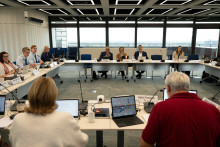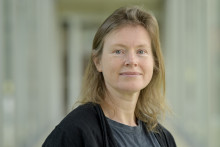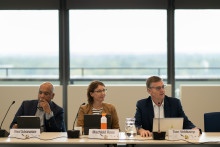Earlier this month, the Executive Board was already foreshadowing a UT-wide organisational change. It did not come to an official announcement on Wednesday morning. What was on the table was a memo, as a subject for discussion on how to deal with organizational changes. And in particular: what is the role of the UT’s participation bodies in this?
In that sense, the 'rules of the game' were the subject of discussion at this public meeting on the basis of the current 'regulation on organisational changes'. A meeting that – surprisingly enough – could count on a lot of interest: about twenty members of the UT community watched via Teams.
Rules
These rules of the game refer to three types of organisational changes – A, B and C. Briefly explained: type A refers to a so-called 'cross-unit organisational change' with a low impact, aimed at rapid cost savings, continuity and efficiency. No matter how small such a change may be, in that case it must be reported to the Executive Board – and in that case it is up to the University Council to approve or reject it. The faculty or service council concerned has the right to advise.
It is different with type B. Then it is a 'local organizational change within a unit, to achieve their financial goals'. This currently applies, for example, to the Faculty of Science & Technology, which announced a reorganisation in September. In that case, the discussion takes place with the local participation bodies. Those also has the right to consent to the plans – or not.
Types A and B must ensure that the faculties and services at the UT can make rapid organisational adjustments, in anticipation of type C: a UT-wide organisational change. This is currently being worked on; In May 2025, an institutional multi-year plan must be on the table. By December 2025 at the latest, the Executive Board wants to have a UT-wide plan for an organisational change or reorganisation in place.
Knocking on the door
On Wednesday morning, the University Council and the Executive Board discussed when there will be a 'cross-unit organisational change'. 'Even if the effect is minimal in another unit, do we deal with it on a case-by-case basis?', asked University Council chair Herbert Wormeester. 'For now, yes', replied Executive Board President Vinod Subramaniam. 'If a unit notices that an organisational change will have a spill-over effect on another unit, it starts with knocking on the door of the other unit concerned. That's where the discussion should start. And then we knock on the door of the University Council.'
Above all, Subramaniam said he wanted to watch over the rights of the decentral participation. 'If one unit has to reorganise, the conversation must take place at that level, within that local participation body. What we don't want to do is infringe on the rights and responsibilities of the decentral participation.'
Confidential or public?
Another thorny point raised by the University Council was the question of when plans are confidential and when they are public. Is that when there is a draft plan, or when the decision is made? 'Broadly speaking, if a plan is in the advisory phase, it is confidential. What is up for consent is public – with respect for people's privacy of course,’ Subramaniam replied.
But can the information be prevented from 'leaking' prematurely, the University Council wondered. Bram Schouwstra, chair of the Faculty Council of Science & Technology, then joined the discussion. 'We will probably receive the reorganisation plan for our faculty next week. But according to the timeline, the conversations with people affected by the reorganization will not take place for two months. In any case, it will be difficult and confusing for the colleagues concerned. That is why we have to make clear agreements about when what is communicated.'
'Reserve tank is empty'
Subsequently, University Council member Laura Vargas raised a communication problem. 'We were informed by email about a meeting about the reorganisation plan of Science & Technology on 17 December. But that was the only announcement that was in that e-mail. People then wonder why? What's going on? Such an e-mail creates feelings of secrecy and unrest.' And, her colleague Eline Marsman added: 'People's reserve tank will run out at some point.'
That is why the University Council urged the Executive Board not to have a UT-wide organisational plan in December next year, but earlier. This is mainly because of the well-being of employees. The Executive Board agreed with trying to speed up the momentum. ‘But the reality is that we have to do it right,’ warned Subramaniam.
In two weeks' time, the Executive Board and the University Council will continue to discuss the concerns and ambiguities raised, such as the role of decentral participation, confidentiality and communication.






